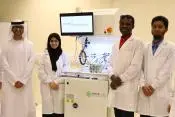PHOTO
Vanadium Redox Flow Batteries Can Provide High Performance Energy Storage for the Future Electrical Grid
Abu Dhabi - Masdar Institute of Science and Technology, an independent, research-driven graduate-level university focused on advanced energy and sustainable technologies is working with the Massachusetts Institute of Technology (MIT) to develop an innovative energy storage technology that can support renewable energy in the UAE.
Dr. Saif Almheiri, an assistant professor of mechanical and materials engineering at the Masdar Institute, is working with MIT on a unique electrochemical energy storage technology that has the potential to be a key storage solution for electrical power sourced from renewable and conventional energy.
"Coming up with ways to store renewable energy so it can be banked when plentiful and distributed when needed is one of the more exciting engineering challenges. There are a few solutions in the market today, but they tend to be expensive and cannot be used in all the operating environments that require renewable energy uptake. But the technology we're working with has the potential to overcome these obstacles" Dr. Almheiri explained.
The battery they are developing aims to help the UAE store its renewable energy in a secure and dependable manner. Developing such a novel energy storage system could also provide the UAE with a valuable product for global energy storage market, which is forecasted to reach US$113.5 billion by 2017. With an effective and realistic energy storage technology, the UAE will be able to take advantage of its plentiful solar and wind energy, providing the country with clean power to take it into the next century.
He believes the needed breakthrough in electrochemical energy storage will be in Redox Flow Batteries (RFBs). An RFB is a rechargeable battery built around two chemical components dissolved in liquids contained within different tanks in the system and the flow of the liquids is separated by a membrane, allowing the electrical energy to be stored in chemical energy, and then converted back into electrical energy when wanted.
Dr. Almheiri is now collaborating with MIT scientists to develop the novel non-water-based VRFB system that provides the higher conductivity, better solubility limits and stable electrodes that tomorrow's reality demands.
"One of the most promising of all of the redox solutions is one based on the metal known as vanadium. Vanadium can exist in a solution in several different oxidation states, so it can effectively take the place of both of the necessary chemical solutions in the RFB - meaning it can be vanadium on each side of the cell. Using the same element avoids the risk of contamination across the membrane that can otherwise, over time, impair or damage a battery," he explained.
Another advantage of the VRFB is that its capacity is limited only by the size of the tanks used to store its electrolytes. Vanadium is easily able to handle the give and take of electrons that is crucial to a rechargeable battery, making it a very stable source element. A VRFB can be discharged and recharged 20,000 times, maintaining their near unchanging battery performance for decades.
This technology, however, is not yet fully optimized. Using a water-based solution to hold the electroactive vanadium imposes two limitations. It requires the operating temperature range for RFBs to be limited to 0-100oC, so the water does not freeze or evaporate. Second, the open circuit voltage is limited to only 1.2V to keep the water solution electrolytes electrochemically stable, which restricts the energy density of RFBs.
"To help VRFB, we are looking to discover new solvents to replace the water. This could allow the open circuit potential to exceed 1.2V, enhancing the energy density of the RFB," Dr. Almheiri said.
Moving forward, Dr. Almheiri and his team will examine various supporting electrolytes and solvents and design advanced electrodes, which conduct electricity, with improved electrochemical reactions and stability. They intend to build a working flow battery cell and will test the system's stability and ability to cycle back and forth - charging, discharging and recharging.
-Ends-
About Masdar Institute
The Masdar Institute of Science and Technology (Masdar Institute) was established by the government of Abu Dhabi as a not-for-profit, private graduate university to develop indigenous R&D capacity in Abu Dhabi addressing issues of importance to the region.
In collaboration with the Massachusetts Institute of Technology (MIT), Masdar Institute has developed an academic and research platform that articulates its mission and vision according to critical energy and sustainability challenges.
An important characteristic of Masdar Institute is its focus on complex real-world problems that require a multidisciplinary approach for the development of solutions from an integrated technology, systems and policy perspective. This multi-interdisciplinary and integrated approach is supported by the structure of its academic programs and by the emphasis placed on engaging external partners from industry, government, and other academic institutions in collaborative activities.
Serving as a key pillar of innovation and human capital, Masdar Institute remains fundamental to Masdar's core objectives of developing Abu Dhabi's knowledge economy and finding solutions to humanity's toughest challenges such as climate change.
Masdar Institute integrates theory and practice to incubate a culture of innovation and entrepreneurship, working to develop the critical thinkers and leaders of tomorrow. With its world-class faculty and top-tier students, the Institute is committed to finding solutions to the challenges of clean energy and climate change through education and research.
Masdar Institute offers degrees in:
•MSc Engineering Systems and Management
•MSc Computing and Information Science
•MSc Materials Science and Engineering
•MSc Mechanical Engineering
•MSc Water and Environmental Engineering
•MSc Microsystems Engineering
•MSc Electrical Power Engineering
•MSc Chemical Engineering
•MSc Sustainable Critical Infrastructure
•PhD in Interdisciplinary Engineering
Please visit our websitehttp://www.masdar.ac.ae/
For more information contact:
Name: Shaima Al Jarman
Director - Marketing & Communications
Public Affairs Department
Email: saljarman@masdar.ac.ae
Phone: +971 02 8109365
© Press Release 2015




















